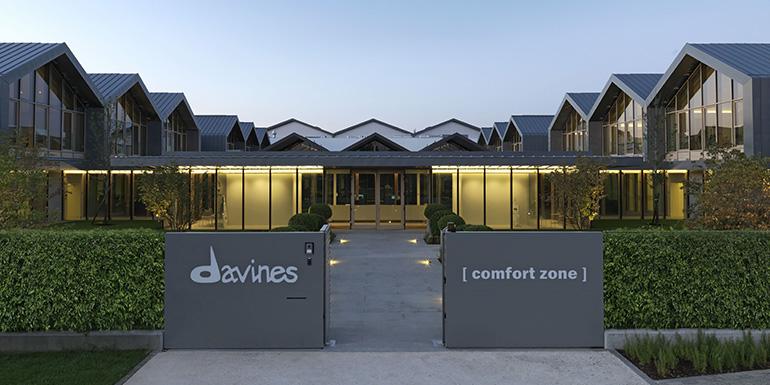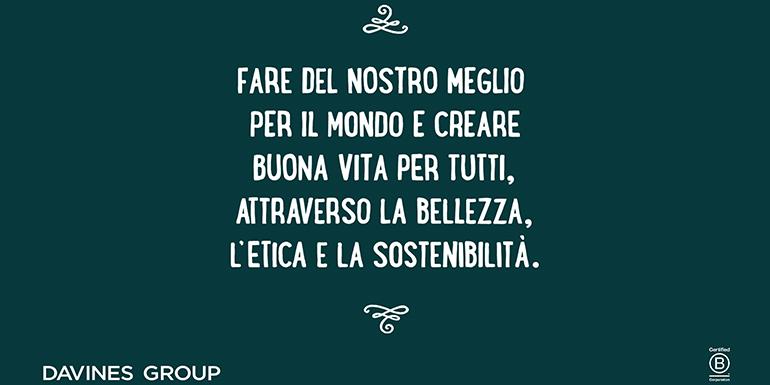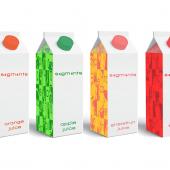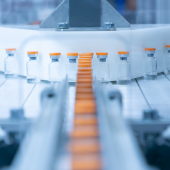A good place to work
The Davines Group, leader in the field of professional cosmetics, and its vision of “regenerative sustainability”, adopted with an integrated and collaborative approach that combines individual and collective well-being with environmental and solidarity issues.
By MilenaBernardi
As Alexander Kjerulf (leading expert at world level on the theme of happiness at work) claims:« Most people chase success at work, thinking that will make them happy. The truth is that happiness at work will make you successful». Alexander Kjerulf (leading expert at world level on the theme of happiness at work).
According to the Davines Group, promoting individual and collective happiness and wellbeing is an action directly related to the environmental theme and contributes to the construction of a regenerative future. In 2005, the company set up its first Ethical Charter, a document that has given rise to a series of initiatives, including the creation of communities of collaborators that on a voluntary basis set up and implement wellbeing projects including “butler” scheme (work-life integration initiatives), corporate solidarity and volunteering, sports activities, etc., in order to offer real care in a company that aims to create a good life for everyone.
Forty years after its foundation, what characterises the Davines Group, leader in the field of professional cosmetics, is its vision of “regenerative sustainability”, adopted with an integrated and collaborative approach. It’s a holistic project based on three fundamental pillars - Planet, People and Community - which together form the Davines Group Regenerative Evolution. The activities are guided by the concepts of beauty and awareness, from production to packaging, as far as ethics in relations inside the company and with the clientele and with all the stakeholders, Davines being a stakeholder- driven company.
A B Corp since 2016 and a Società Benefit (Benefit Corporation) since 2019, it has 517 workers in the Parma site, of which 60% are female. What distinguishes its corporate welfare, or well-fair, is an evolved integrated work-life plan which implies the harmonious coexistence between work and private life. Starting from the assumption that a happy worker is also more productive, Davines has set itself the objective of supporting the employee in the management of daily commitments, in a way which is consistent with its mission. “We do our best for the world, creating a good life for all through beauty, ethics and sustainability.”
Stefania Bollati, board member and Davines Group head of wellbeing, tells us why promoting a positive climate at work is so important.
Why has attention towards employees increased so much in recent years?
For a B Corp, and even more so for a family company, the construction of its identity comes from the people who are part of it, making it a “living organism”. Satisfied, recognised, balanced, happy people are people able to bring positive creative energy into a company and transmit this to customers who, besides being a key stakeholder, are the lifeblood from which to draw resources to continue creating a good life for everyone. There is much criticism of the traditional business model at present, expressed through the Great Resignation, Quiet Quitting and the Yolo Economy. Companies have to assimilate this strong message and provide young people with a meaning “other” than having a mere economic return from their work.
When did you start to lay the foundation of your welfare platform?
The wellbeing of people has always been a priority for us. We can consider as a beginning the work done on the Ethical Charter in 2005; this paved the way for a good part of the initiatives to promote the well-being of our workers, including the work-life integration ones.
The Ethical Charter is the wonderful book that contains the Davines Group values that the colleagues at the time understood they wanted to live by in the company. It was a maieutic exercise in which people were able to explicitly express their adherence to key principles for our business. A second Charter followed this first one, in 2018, drawn up with the help of an Olivetti-style philosopher who inspired us during the workshops.
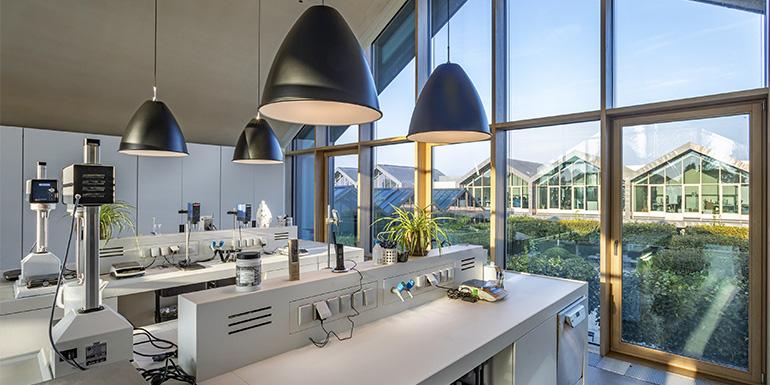
Are there limits to the application of the work-life integration model for a manufacturing company like yours?
As a manufacturing company, we will always have a functional limit; in all events, the development of a work environment that respects work-life integration remains a priority for us. One of our objectives is to make the Davines Group become “educational”, in the sense of “educere”, that is, to manage to create the conditions in which our people can express their true selves. One of our aims would be the creation of a training and personal growth academy also open to people from outside the company.
What activities have you set up to guarantee a correct synergy between home and work?
Some examples could be: the elimination of clocking in and a flexible starting time; up to 50% remote working; integration of optional maternity leave; the granting of holidays; 20 hours per year of self-certified sick leave; 32 hours per year of leave to encourage volunteer work; 12 hours per year of leave for medical appointments; daily support initiatives managed by our internal communities (car maintenance, car washing, laundry, delivery of medicines, delivery of personal post); conferences; days dedicated to families; the Davines Care welfare platform, etc..
How have the workers reacted to your open-mindedness?
The same workers have been involved in the process, some voluntarily, actively participating in the creation of our internal communities. The positive feedback can be seen in the results of important surveys like the Great Place to Work survey, in which the highest values are: pride, camaraderie and credibility.
A model of this kind also assumes a great deal of trust on the part of the organization towards the employee. Have you ever been disappointed?
We are realistic! A human being is unlikely to disappoint if they see all their demands (in terms of values, needs of various kinds, etc.) met. It’s true that people inevitably often believe they are "worth" more than what they receive. It’s a journey of awareness that relates to the meaning of work, going beyond a performance valuation, and representing the way a person can achieve their own completeness and satisfaction. As long as work remains to be seen as a tool for satisfying economic needs, both sides will inevitably be disappointed.

The perception of never really being able to switch off from work could increase with work life integration. Have you set yourselves rules of behaviour?
Rather than rules, we have set out a number of recommendations and suggestions. For example, to avoid organising meetings during the lunch break or before normal working hours, to take regular breaks from the computer screen, to give yourself a small pause between one call and another … In addition, we advise against sending e-mails during the weekend or outside working hours; in any case, if this should happen, the one receiving the e-mail is not obliged to respond. Smart working policies fail when the concept that life and work should not be separated (as we live also when working) is poorly understood; not all of life is work, but certainly work plays a very important role in all our lives. We need to actively transmit life into work; the failure of the policy occurs when work prevails over life.
The model assumes a deep cultural change. Are there significant differences between different generations?
Yes, certainly. Culturally, many companies and the people themselves, are programmed according to outdated principles: first duty and then pleasure, nothing arrives without sacrifice, lead rather than cooperate, etc. It takes great courage to break these mental patterns and recognize that sacrifice, for example, is nothing other than returning to the sacred. That is, giving sacredness to what you do. Luckily, the true meaning is found within the words. There are managers that still prefer control over trust but the data already show that “flow” is achieved when you carry out challenging work in conditions of autonomy. This “flow” is the positive energy that moves all things (see Mihàly Csìkszentmihàlyi). Cultural programming is most rooted in previous generations; the gap can be bridged, however, by people with learning agility, that is, the ability to adapt to changes.
What else have you got planned?
Further to a need expressed by our workers and confirmed by various international surveys, in the medium-term we will be implementing new training actions and plans on the theme of physical and mental health. We will deal with primary prevention (healthy habits), secondary prevention (medical exams), psychological wellbeing (psychological help-desks), and family wellbeing (children, caregivers). In particular, we would like to introduce a school orientation platform for our workers’ children in Italy.


